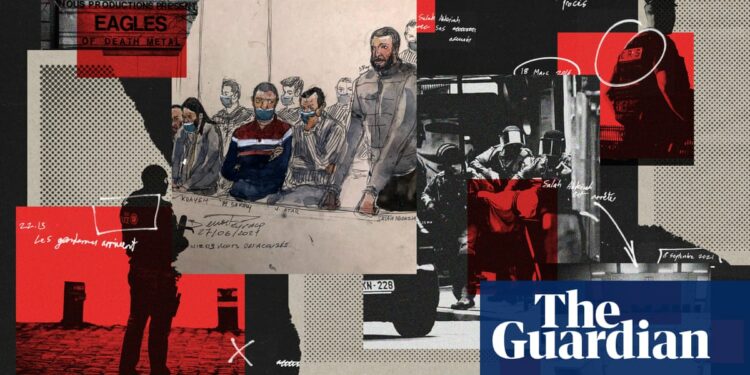On 13 November 2015, 130 people were murdered by Islamist extremists. Six years later, the trial began. I attended court every day to try to understand the killers’ motivations and hear from those whose lives had been irrevocably changed
Noon, 8 September 2021. Central Paris, Île de la Cité. The trial that gets under way today will not be the Nuremberg of terrorism, as some have said: whereas high Nazi dignitaries were put on trial in Nuremberg, here the defendants are second stringers, since those who did the killing are dead. Nevertheless, this trial too will be enormous, unprecedented, something I want to witness. Without being a specialist in Islam – let alone in Arab studies – I am interested in religions, their pathological mutations and the question: where does this pathology begin? When it comes to God, where does the madness start? What goes on in these guys’ minds? But the main reason I want to spend a year attending this trial is that hundreds of human beings will describe the experience of having lived through the night of 13 November 2015, when Islamic State fighters killed 130 people at the Stade de France, the Bataclan and on the cafe terraces in eastern Paris and wounded hundreds more. Those who survived the attack or survived their loved ones, will stand before us and speak. Day in, day out, we will hear extreme experiences of death and life, and I think that between the time we first enter this courtroom and when we leave it for good, something in all of us will have shifted ground. We don’t know what we’re waiting for; we don’t know what will happen. We go in.
At 12.25pm a tremor runs through the courtroom. Heavily escorted by gendarmes, the accused enter the bulletproof box. Most of what we see is the reflection in the glass, and not the defendants behind it. We stand up, crane our necks, and wonder: is he there? Yes, he is. Salah Abdeslam is there. He’s the one in the black polo shirt, the furthest from us, the only surviving member of the group of fighters. If he’s at the back of the box it’s not to prevent us from seeing him but because they’re seated in alphabetical order. He’s the first in a long series of A’s: Abdeslam, Abrini, Amri, Attou, Ayari. A bell rings shrilly and a voice says: “All rise.” Everyone stands, as if at mass. The presiding judge and the four assistant judges come in and take their seats. With a hint of a Marseille accent, the presiding judge says: “Please be seated, the court is now in session.” It’s begun.
Continue reading…
Source link : https://www.theguardian.com/world/2024/nov/07/inside-the-paris-attacks-trial-a-man-stood-up-and-said-stop-it-what-are-you-doing-one-of-the-killers-shot-him
Author : Emmanuel Carrère
Publish date : 2024-11-07 05:00:50
Copyright for syndicated content belongs to the linked Source.






